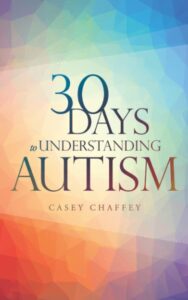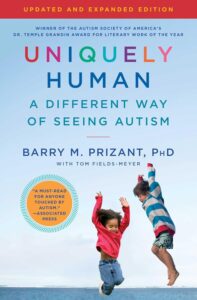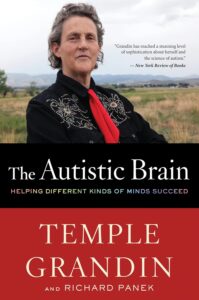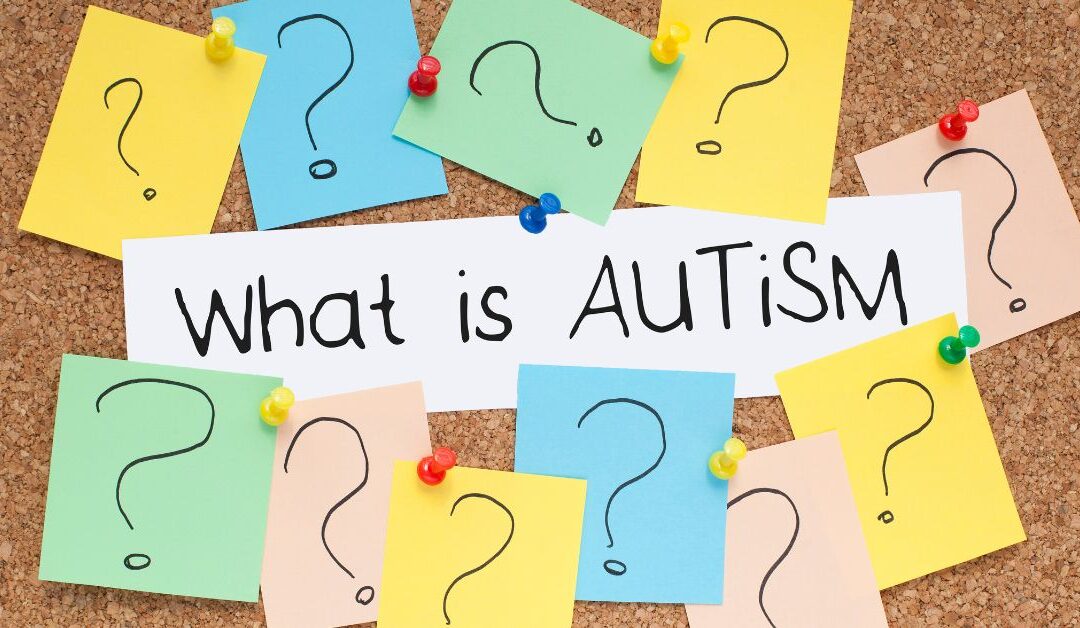Whether your child has just been diagnosed with autism or if you meet someone new who doesn’t understand your child’s behavior, sometimes it’s not easy to explain what autism is to family, friends and others. That is why I’ve written this autism explainer blog post. Feel free to send the link for this post to others who you would like to better understand autism and, therefore, your child.
What is autism?
The Mayo Clinic defines autism as a “condition related to brain development that impacts how a person perceives and socializes with others, causing problems in social interaction and communication. The disorder also includes limited and repetitive patterns of behavior. The term ‘spectrum’ in autism spectrum disorder refers to the wide range of symptoms and severity.
Autism spectrum disorder includes conditions that were previously considered separate — autism, Asperger’s syndrome, childhood disintegrative disorder and an unspecified form of pervasive developmental disorder. Some people still use the term ‘Asperger’s syndrome,’ which is generally thought to be at the mild end of autism spectrum disorder.”
While that is the clinical definition, I generally think of autistic individuals as having brains that are wired differently than those who are neurotypical. They think and approach things in a different way, which can be a great for diversity of thought and fresh perspectives in the world. Yet, these differences can be a real challenge for autistics, loved ones, friends, co-workers and others as they try to understand one another.
What are the traits of autism?

Autistic individuals can have a variety of traits. Not everyone will have all of these, and the mildness or severity of each will differ per person. If you’ve heard that each person who is autistic is unique, that is very true.
Common traits of autism can include:
- Difficulty with communication
- Lack of social skills
- Trouble with executive function skills
- Sensory issues
- Repetitive patterns of behavior
- Focused special interests
- Rigid adherence to routines
- Difficulty transitioning to new activities
- Stimming for self-regulation
- Learning difficulties
- Lack of eye contact
- Struggles with friendships
- Trouble with perspective taking
Autism is on a spectrum
Autism Spectrum Disorder is called that because autistic individuals have a wide range of capabilities and abilities depending on where they fall on the spectrum.
You may have heard some people describes autistic children as “low functioning” or “high functioning.” This isn’t really the best description because anyone who is autistic could be higher functioning in one area and lower functioning in another.
Autism is better explained by their levels:
• Level One: Requires Support
• Level Two: Requires Substantial Support
• Level Three: Requires Very Substantial Support
For a better understanding of what each level looks like, you can read my blog post about the autism levels.
What causes autism?
Experts don’t know exactly what causes autism except that it is related to genetics. If you have a family member who is autistic, then your chances of having an autistic child are greater.
They have identified a few other factors that can increase the risk of a child having autism. Those include:
- If the child has Down Syndrome or Fragile X Syndrome (or another chromosomal disorder)
- Low birth rate or born pre-term
- Parents who are older when they conceive the child
- Pregnancy complications
Years ago, there was a push to say that vaccinations caused autism, but that theory was debunked a long time ago. There was one study that claimed it, but it was flawed. Scientists have found no association between childhood immunizations and autism. Yet, there are those who still promote this idea. If you hear anyone say that, know that it has been proven not to be true.
Autism vs. Autistic

You may hear a debate about whether autistic people want to be referred to as person or identify first. For the autistic community, the overall majority prefer “autistic” versus “with autism.”
Since I write my blog for parents of autistic children, I use both because I found parents sometimes prefer to note their child “with autism.” I try to be sensitive to both preferences by alternating how I use it on my blog. However, please note that autistic people themselves generally prefer to be referred to as being “autistic.”
What are the general supports that are provided to autistic children?
You may hear your family member or friend discuss various care and services they are getting for their autistic child. There are many options, and those depend on the challenges the child needs help with. They can include:
- Cognitive behavior therapy
- Speech therapy
- Occupational therapy
- Applied Behavioral Analysis (ABA)
- Individualized Education Plans (IEP) or 504 plans at school
- Behavior intervention plans
- Recreational therapy
- Music therapy
- Art therapy
- Equine therapy
- Medications
- Nutritional counseling
- Physical therapy
An autistic child may receive a few of these or many of them. It depends on their unique challenges.
Do people grow out of autism?
The media portray autism mostly as a childhood condition. However, autistic children grow into autistic adults. There is no “cure” for autism because it’s not an illness – it is a brain development. Once someone is autistic, they are autistic all their life. You can read my blog post about autistic adults.
How can I help my family member or friend who has an autistic child?

So how can you help your family member or a friend who is a parent of an autistic child? In more ways than you think. Here are some suggestions:
- Learn all you can about autism to understand their child and the child’s behavior.
- Be an ear to listen and a shoulder to cry on when needed. Having an autistic child has its rewards and challenges. Be there to celebrate every small victory for their child and also be there when the stress seems more than your family member or friend can handle.
- Invite them to do things. Even if they repeatedly have to decline (especially at the last minute), keep asking them to come to gatherings, birthday parties, playdates at the park, etc.
- Ask your family member or friend what can you do to make their child more comfortable when they visit your home. Maybe it’s identifying a safe place for them to go and calm down, keeping music and other noise to a minimum, or having the child’s favorite snack available. Let them know you want to help make things easier for them.
- Offer to give them respite by watching their child for an hour or two. That can make a huge difference for parents of an autistic child who do not get enough regular breaks. Many parents are reluctant to ask family and friends to help watch their child because they don’t want to burden them. Your offer to help would mean the world to them.
- Run an errand for your family member or friend. Sometimes, taking an autistic child on multiple errands can be challenging. Offer to pick up a few things at the grocery store or drug store for your friend, or run one of their other children to an activity for them.
- Find out what their autistic child’s special interest is and look for ways to support it. Maybe it’s an outing you can arrange or pick up a book that you think their child will enjoy. If you find a YouTube or other video related to their interest you think they would like, text the link to the parent to share with the child. Show that you care by being involved with what matters to their child.
Where can I find out more about autism?
If you want to dive deeper and find out more about autism, you can click on any of the website listed on my Resources page.
Here are some other resources you may find helpful.
30 Days to Understanding Autism (affiliate link)

Uniquely Human: Updated and Expanded: A Different Way of Seeing Autism (affiliate link)

The Reason I Jump: The Inner Voice of a Thirteen-Year-Old Boy with Autism (affiliate link)

The Autistic Brain: Helping Different Kinds of Minds Succeed (affiliate link)

Autism Spectrum Disorder (revised): The Complete Guide to Understanding Autism (affiliate link)









